A Business Development Coordinator plays a key role in expanding a company's market and increasing its revenue. They focus on forming strategic partnerships and improving the organization's financial growth through various business strategies.
This role requires a mix of skills including market research, project management, and effective communication. Additionally, the ability to negotiate and a strong understanding of company products and market trends are crucial.
Candidates can write these abilities in their resumes, but you can’t verify them without on-the-job Business Development Coordinator skill tests.
In this post, we will explore 9 essential Business Development Coordinator skills, 11 secondary skills and how to assess them so you can make informed hiring decisions.
Table of contents
9 fundamental Business Development Coordinator skills and traits
The best skills for Business Development Coordinators include Market Research, Sales Strategy, Client Relationship Management, Data Analysis, Communication Skills, Project Management, Negotiation Skills, Networking and Financial Acumen.
Let’s dive into the details by examining the 9 essential skills of a Business Development Coordinator.
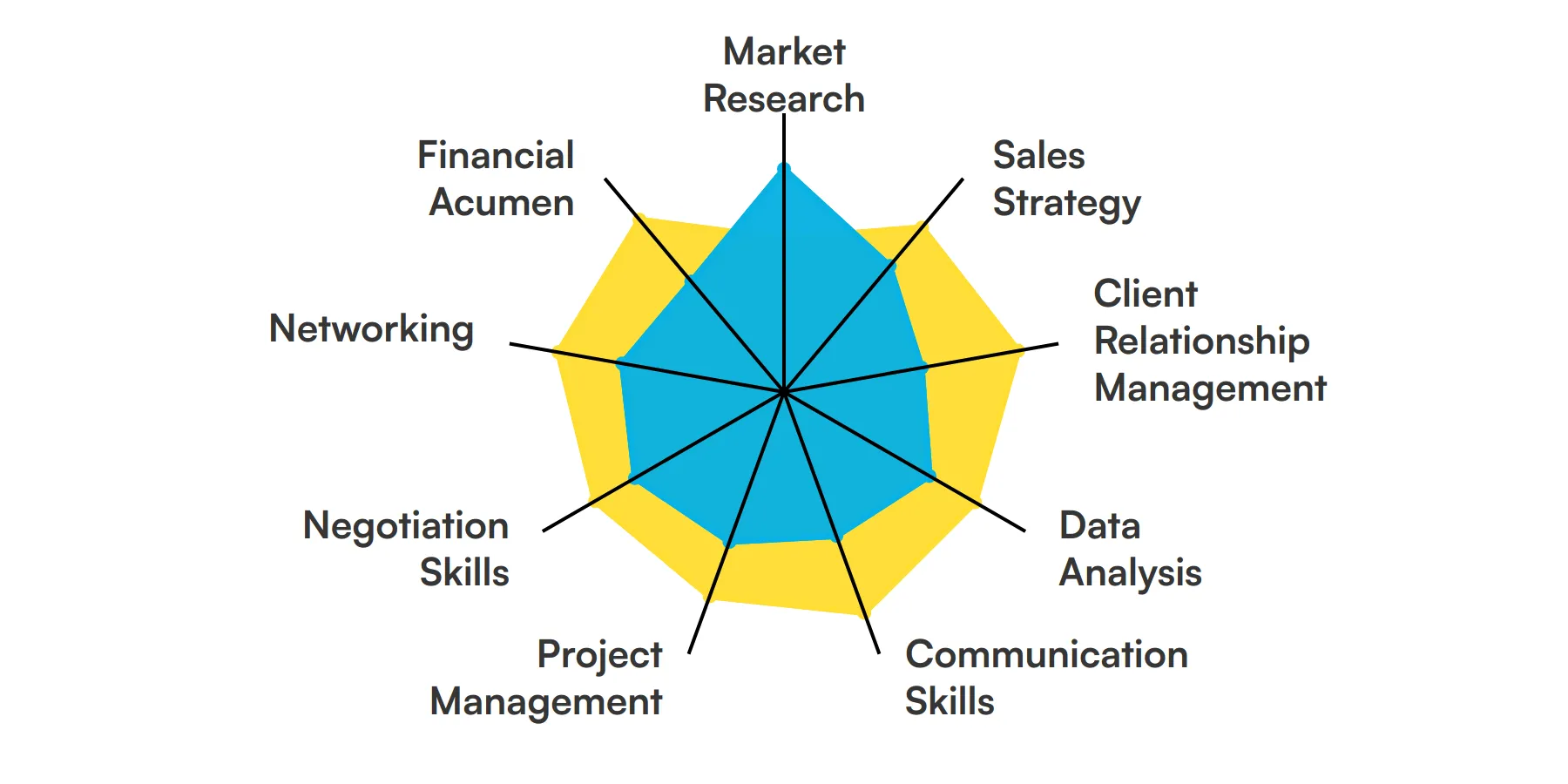
Market Research
Understanding market trends and customer needs is key for a Business Development Coordinator. This skill helps in identifying new business opportunities and staying ahead of competitors.
For more insights, check out our guide to writing a Marketing Analyst Job Description.
Sales Strategy
Developing and implementing sales strategies is crucial. It involves planning and executing tactics to meet sales targets and drive revenue growth.
Client Relationship Management
Building and maintaining strong relationships with clients ensures long-term business success. This skill helps in understanding client needs and providing tailored solutions.
Check out our guide for a comprehensive list of interview questions.
Data Analysis
Analyzing data to make informed business decisions is essential. It involves interpreting sales data, market trends, and customer feedback to optimize strategies.
Communication Skills
Effective communication is vital for coordinating with team members, clients, and stakeholders. It ensures that everyone is on the same page and working towards common goals.
For more insights, check out our guide to writing a Communications Manager Job Description.
Project Management
Managing multiple projects simultaneously requires strong organizational skills. This involves planning, executing, and monitoring projects to ensure they are completed on time and within budget.
Negotiation Skills
Negotiating deals and contracts is a key part of the role. This skill helps in securing favorable terms and building mutually beneficial partnerships.
Networking
Building a strong professional network is important for identifying new business opportunities. It involves attending industry events and connecting with potential clients and partners.
Check out our guide for a comprehensive list of interview questions.
Financial Acumen
Understanding financial statements and budgets is crucial for making informed business decisions. This skill helps in managing resources effectively and ensuring profitability.
11 secondary Business Development Coordinator skills and traits
The best skills for Business Development Coordinators include CRM Software, Digital Marketing, Presentation Skills, Time Management, Problem-Solving, Adaptability, Technical Proficiency, Event Planning, Content Creation, Customer Service and Research Skills.
Let’s dive into the details by examining the 11 secondary skills of a Business Development Coordinator.
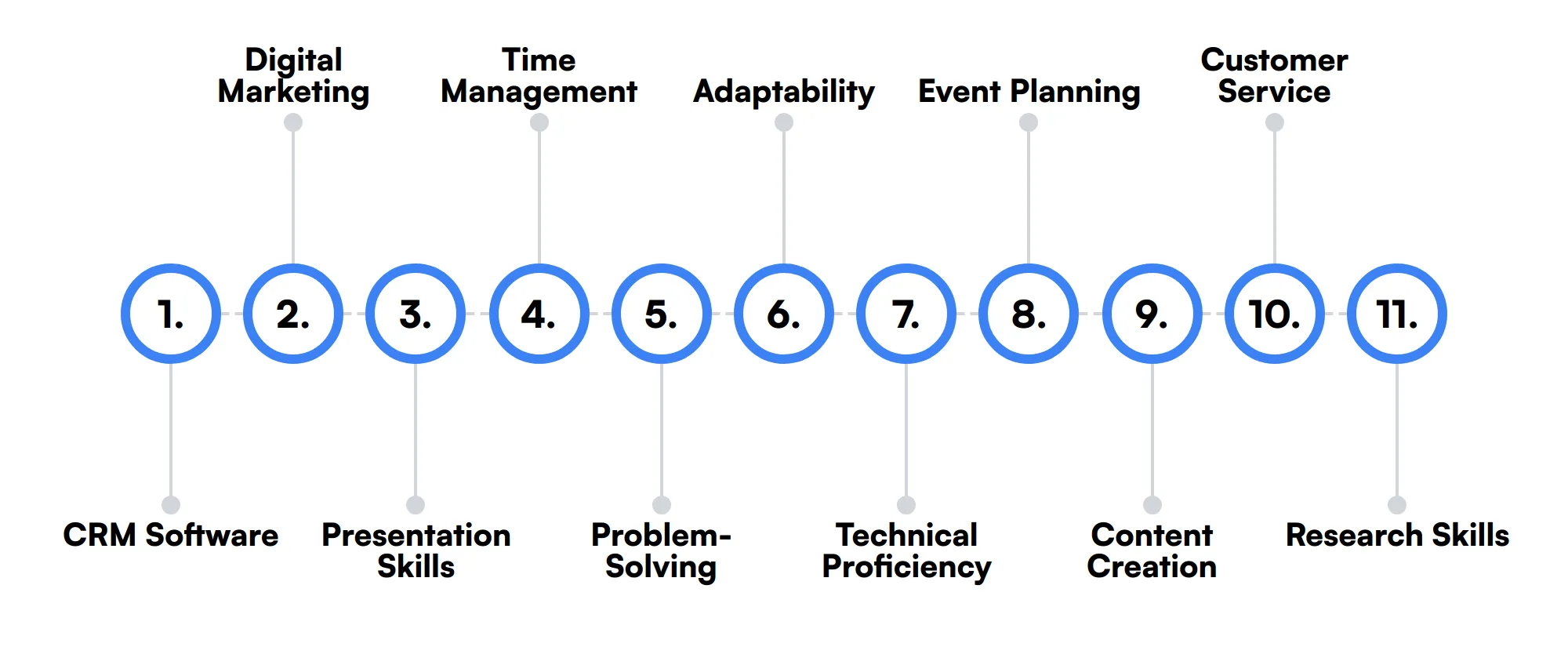
CRM Software
Familiarity with Customer Relationship Management (CRM) software helps in managing client information and tracking interactions efficiently.
Digital Marketing
Knowledge of digital marketing techniques can enhance outreach efforts. This includes understanding SEO, social media marketing, and email campaigns.
Presentation Skills
Being able to present ideas and proposals clearly is important. This skill helps in persuading clients and stakeholders to support business initiatives.
Time Management
Effectively managing time ensures that tasks are completed efficiently. This skill is important for balancing multiple responsibilities and meeting deadlines.
Problem-Solving
Identifying and resolving issues quickly is crucial. This skill helps in overcoming obstacles and ensuring smooth business operations.
Adaptability
Being adaptable to changing market conditions and client needs is important. This skill helps in staying relevant and competitive in the industry.
Technical Proficiency
Proficiency in using various software and tools is beneficial. This includes familiarity with Microsoft Office, project management tools, and data analysis software.
Event Planning
Organizing and managing events can help in promoting the business. This skill involves coordinating logistics, marketing, and follow-up activities.
Content Creation
Creating engaging content for marketing and communication purposes is valuable. This includes writing blog posts, social media updates, and promotional materials.
Customer Service
Providing excellent customer service helps in building client loyalty. This skill involves addressing client concerns and ensuring a positive experience.
Research Skills
Conducting thorough research is important for informed decision-making. This skill helps in gathering relevant information and staying updated on industry trends.
How to assess Business Development Coordinator skills and traits
Assessing the skills and traits of a Business Development Coordinator involves more than just glancing at a resume. It's about understanding how well they can handle market research, devise sales strategies, manage client relationships, and more.
While traditional hiring methods rely heavily on interviews and CV reviews, these approaches often fall short in measuring actual competencies in areas like data analysis, project management, and financial acumen. This is where skills assessments come into play, offering a more objective and comprehensive evaluation method.
For instance, using Adaface assessments can transform your hiring process by ensuring that you're not just guessing about a candidate's abilities in negotiation, networking, or communication skills. With tailored assessments, you can measure each skill directly relevant to the role of a Business Development Coordinator. Learn more about Adaface assessments here.
Let’s look at how to assess Business Development Coordinator skills with these 6 talent assessments.
Market Research Test
Our Market Research Test evaluates a candidate's proficiency in market research techniques and their ability to analyze and interpret data effectively.
The test assesses their understanding of market research, market analysis, data analysis, and data interpretation through multiple-choice questions.
Successful candidates demonstrate a strong ability to gather, analyze, and utilize market data to make informed business decisions.

Sales Aptitude Test
The Sales Aptitude Test measures a candidate's skills in sales, including their ability to handle objections, negotiate, and close deals.
This test evaluates objection handling, negotiation, closing techniques, communication, and critical thinking skills using scenario-based questions.
Candidates who score well are adept at maintaining customer relationships and resolving conflicts effectively.
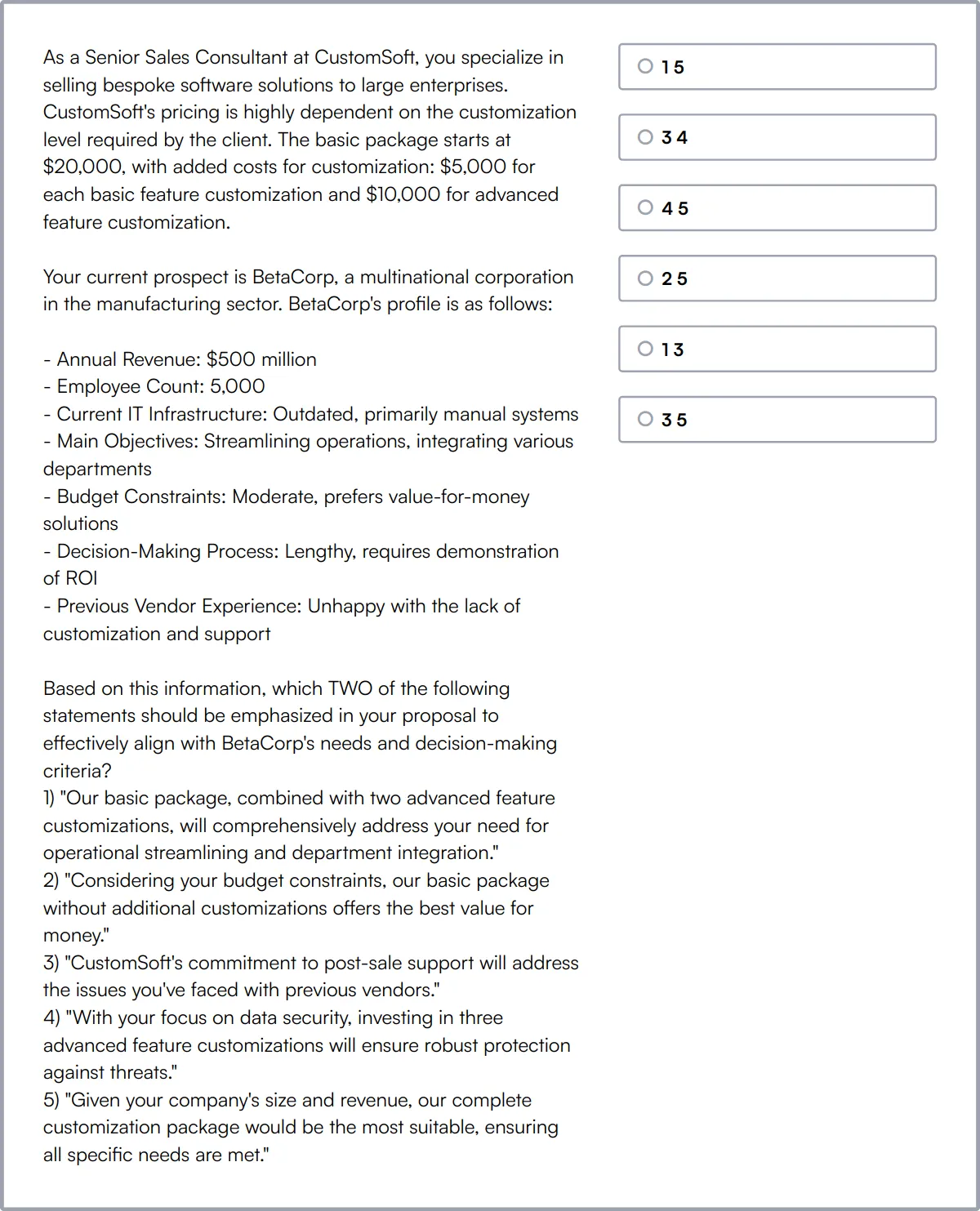
Customer Service Test
Our Customer Service Test assesses how well candidates can manage customer interactions and resolve issues with professionalism and empathy.
The test challenges candidates with real-life scenarios to evaluate their customer service skills, problem-solving abilities, and empathy.
High-scoring individuals excel in providing thoughtful and effective solutions to customer issues, ensuring a high level of customer satisfaction.
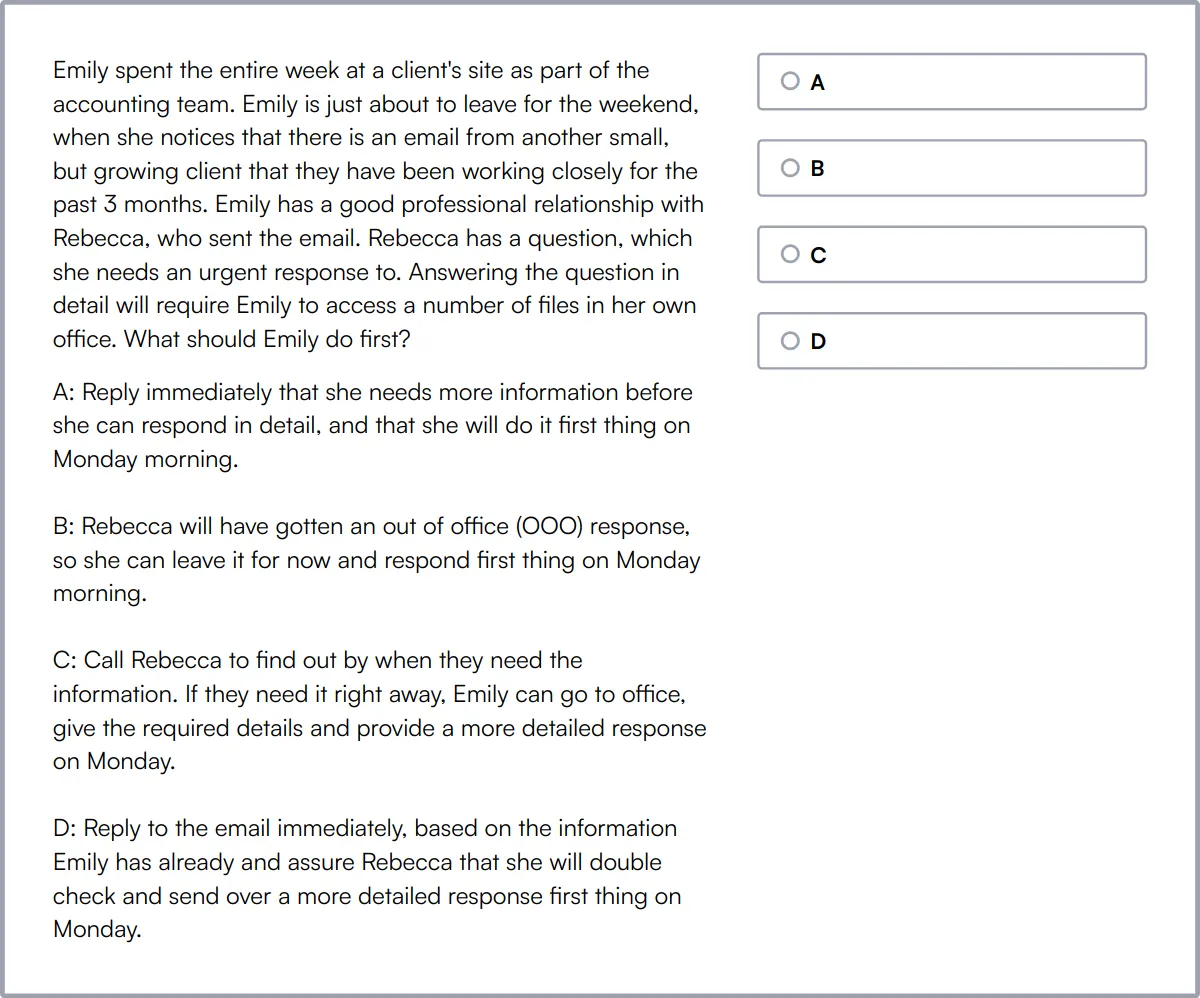
Data Analysis Test
The Data Analysis Test screens candidates on their ability to analyze and interpret data, using tools like SQL and Excel.
It covers data modeling, data analysis, business analysis fundamentals, and data interpretation skills.
Candidates proficient in these areas can effectively extract insights from data and contribute to data-driven decision-making processes.

Communication Skills Test
Our Communication Skills Test evaluates a candidate's ability to communicate clearly and effectively in various professional scenarios.
The test examines verbal and written communication skills, situational judgement, and critical thinking.
Effective communicators identified by this test can significantly enhance team collaboration and stakeholder engagement.
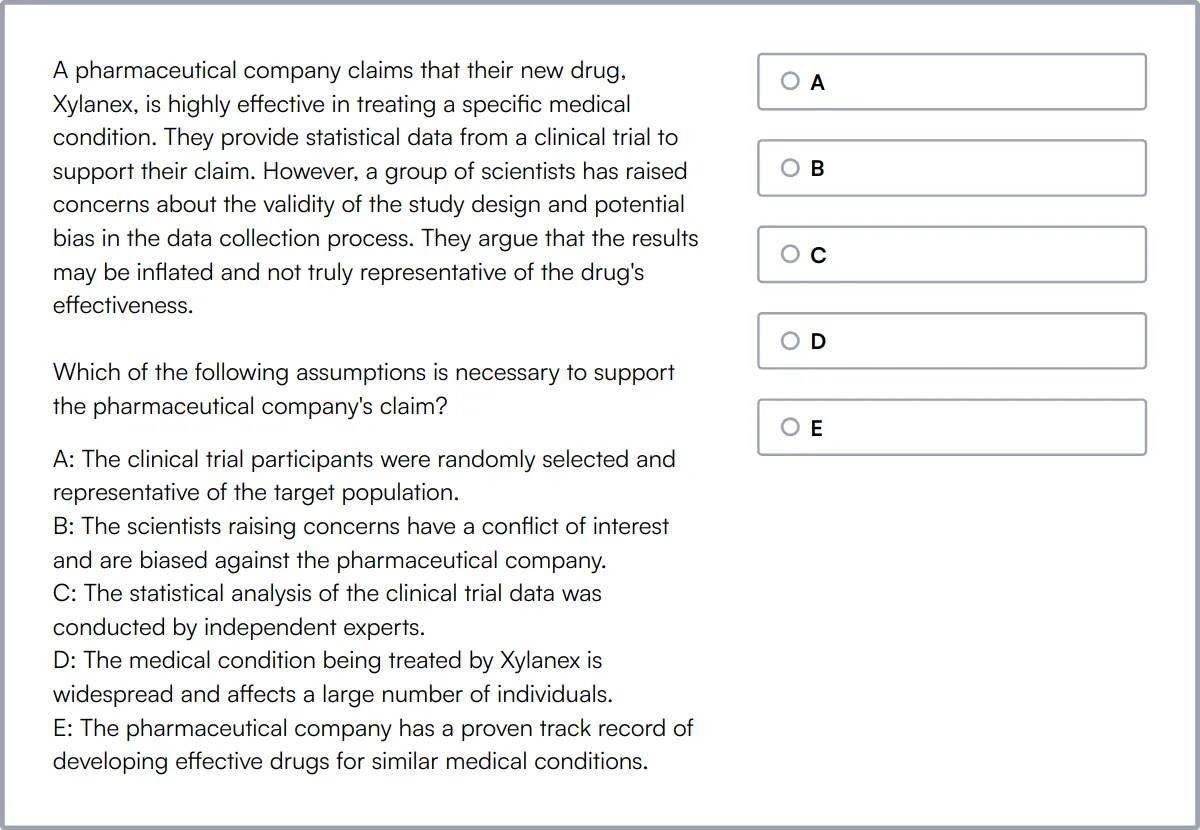
Project Management Test
The Project Management Test assesses a candidate's capability to manage projects from inception to completion, ensuring all phases are executed effectively.
This test evaluates skills in cost and budget estimation, situational judgement, stakeholder management, and understanding of agile and traditional project management methodologies.
Skilled project managers can efficiently allocate resources, manage timelines, and lead teams to successfully deliver projects.
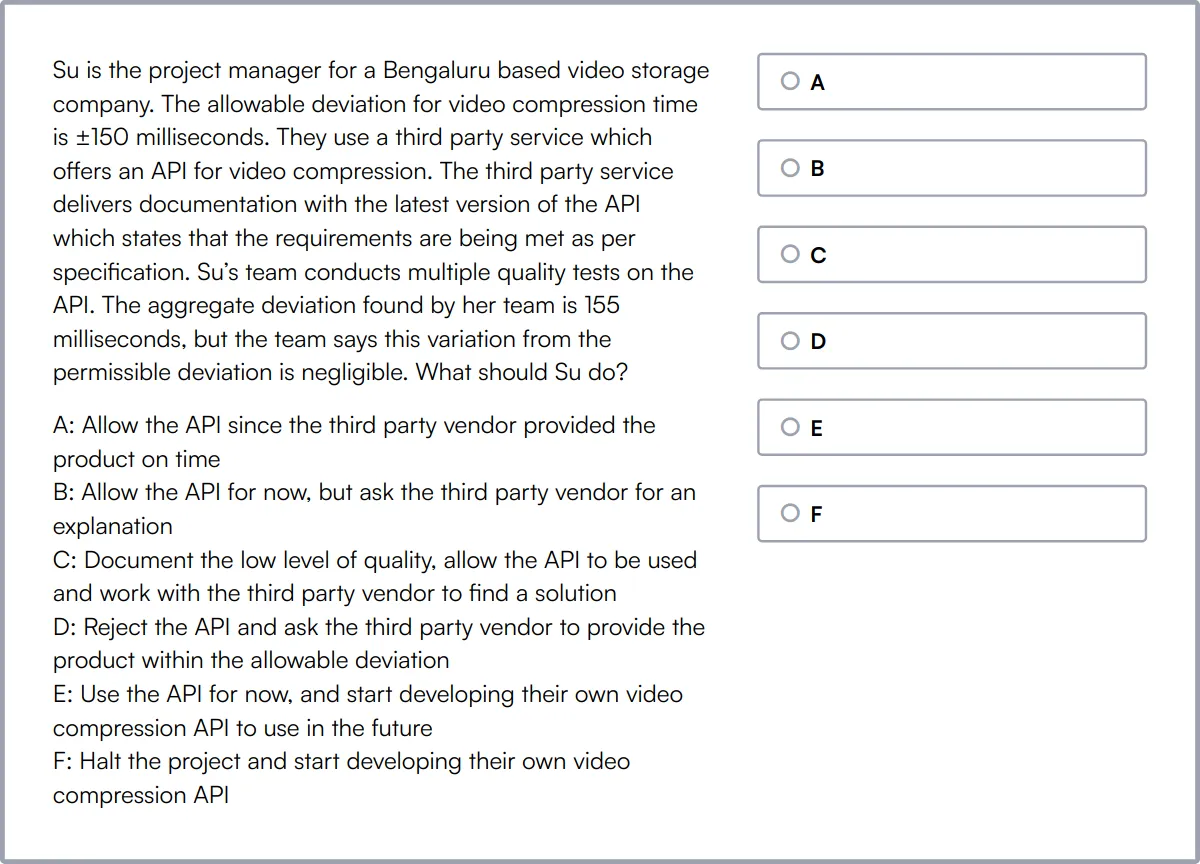
Summary: The 9 key Business Development Coordinator skills and how to test for them
| Business Development Coordinator skill | How to assess them |
|---|---|
| 1. Market Research | Evaluate ability to gather and analyze market data effectively. |
| 2. Sales Strategy | Assess understanding and application of strategic sales planning. |
| 3. Client Relationship Management | Review techniques for maintaining and enhancing client relationships. |
| 4. Data Analysis | Check proficiency in interpreting and leveraging data insights. |
| 5. Communication Skills | Observe clarity, conciseness, and effectiveness in communication. |
| 6. Project Management | Test skills in organizing, planning, and executing projects. |
| 7. Negotiation Skills | Simulate scenarios to assess negotiation tactics and outcomes. |
| 8. Networking | Measure capability to establish and maintain professional contacts. |
| 9. Financial Acumen | Examine understanding of financial strategies and economic factors. |
Communication Skills Test
Business Development Coordinator skills FAQs
What are the key skills required for a Business Development Coordinator?
Key skills include Market Research, Sales Strategy, Client Relationship Management, Data Analysis, Communication Skills, and Project Management.
How can recruiters assess Market Research skills in candidates?
Recruiters can assess Market Research skills by asking candidates to describe their experience with data collection, analysis, and how they have used market insights to drive business decisions.
What questions should be asked to evaluate a candidate's Sales Strategy skills?
Ask candidates to explain their approach to developing and implementing sales strategies, including examples of successful campaigns and how they measure success.
How important are Communication Skills for a Business Development Coordinator?
Communication Skills are crucial for effectively conveying ideas, building relationships, and collaborating with team members and clients.
What methods can be used to test a candidate's Data Analysis abilities?
Provide a case study or data set and ask candidates to analyze it, draw conclusions, and present their findings.
How can recruiters evaluate a candidate's Project Management skills?
Ask candidates to describe their experience managing projects, including how they plan, execute, and monitor progress, as well as any tools they use.
What are some ways to assess a candidate's Negotiation Skills?
Conduct role-playing scenarios where candidates must negotiate terms or resolve conflicts, and evaluate their approach and outcomes.
Why is Financial Acumen important for a Business Development Coordinator?
Financial Acumen is important for understanding budgets, forecasting, and making informed decisions that impact the company's bottom line.

40 min skill tests.
No trick questions.
Accurate shortlisting.
We make it easy for you to find the best candidates in your pipeline with a 40 min skills test.
Try for freeRelated posts
Free resources



